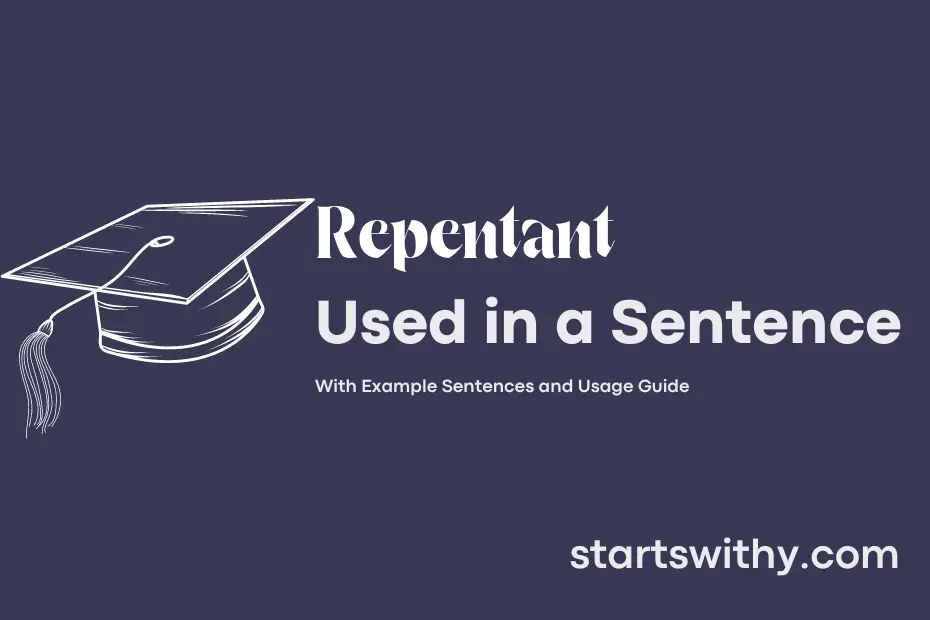Have you ever encountered someone who shows deep remorse or regret for their actions? This type of individual can be described as repentant. Repentant means feeling or expressing sincere regret or remorse for one’s wrongdoing.
When someone is repentant, they acknowledge their mistakes and seek to make amends for their past actions. This quality often involves a sense of personal responsibility and a genuine desire to change for the better.
7 Examples Of Repentant Used In a Sentence For Kids
- Repentant means feeling sorry for something you did wrong.
- When you are repentant, you say sorry for your mistakes.
- It’s important to be repentant and learn from your errors.
- If you are repentant, you can make things right again.
- Teachers like when students are repentant and try to improve.
- Being repentant shows that you care about others’ feelings.
- Everyone can be repentant and change their actions for the better.
14 Sentences with Repentant Examples
- Repentant for missing the deadline, I promised myself to manage my time better for future assignments.
- After failing the test, I felt repentant for not studying enough.
- Realizing the importance of attending classes regularly, I felt repentant for skipping too many lectures.
- Standing outside the Principal’s office, I was repentant for breaking the college rules.
- Repentant for not participating in extracurricular activities earlier, I decided to join a club this semester.
- Feeling repentant for not seeking help earlier, I finally approached my professors for guidance.
- Seeing my low grades, I became repentant for not taking my studies seriously.
- Watching my friends excel in their studies, I felt repentant for procrastinating so much.
- Realizing the impact of my actions on my future, I became repentant for my careless behavior.
- Reflecting on my past semester, I felt repentant for not making the most out of my college experience.
- After a heated argument with a classmate, I became repentant for my harsh words and apologized to them.
- Feeling repentant for neglecting my health, I decided to start exercising regularly and eating healthier.
- Waking up with a hangover after a night of partying, I felt repentant for not prioritizing my studies over social events.
- As the deadline approached, I became repentant for not starting on my project earlier and ending up rushing to complete it.
How To Use Repentant in Sentences?
Repentant means feeling or expressing sincere regret or remorse about one’s wrongdoing. To use it in a sentence, start with a subject followed by the verb expressing the action, and then the word repentant to describe the feeling of remorse. For example, “After realizing he had hurt his friend’s feelings, John felt repentant and apologized.”
You can also use repentant with different subjects and verbs to convey regret in various contexts. For instance, “The thief appeared repentant after being caught by the police.” Here, the word repentant describes the thief’s regret for their actions.
When using repentant in writing, consider the tone and the context in which the word is being used. It is important to ensure that the word fits the emotion or sentiment you are trying to convey accurately.
Additionally, repentant can be used in various tenses, so consider the timing of the action or feeling described. For example, “She will be repentant once she understands the impact of her actions.” In this sentence, the word repentant is used to express a future feeling of regret.
By following these guidelines and considering the context and timing of the action, you can effectively incorporate the word repentant into your sentences to convey feelings of regret or remorse.
Conclusion
In summary, the examples of sentences with “repentant” demonstrate the feeling or expression of remorse, regret, or sorrow for past wrongdoings or actions. Whether it’s a character in a story seeking forgiveness, a person reflecting on their mistakes, or a religious context emphasizing the importance of repentance, the word “repentant” conveys a sense of contrition and a desire to make amends. This emotional state is often accompanied by a willingness to change, seek redemption, and strive for personal growth.
Overall, the usage of “repentant” in sentences illustrates the complexities of human emotions and the universal theme of seeking forgiveness and redemption. It serves as a reminder of the power of acknowledging wrongdoing, taking responsibility, and working towards a more positive and ethical path forward.



